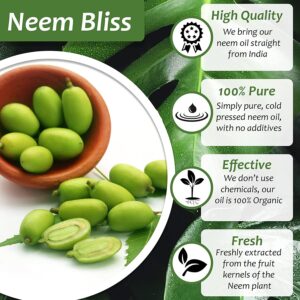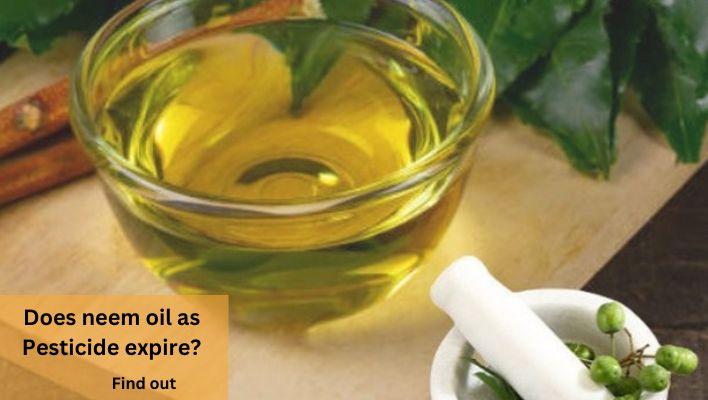Neem oil is a popular natural pesticide made from the seeds of the neem tree. It is known for its effectiveness in controlling pests and diseases while being safe for humans, animals, and the environment. But does neem oil expire?
If you have a bottle of neem oil, you haven’t used for a while; you may wonder if it’s still good. Like any other product, knowing if neem oil has an expiration date is essential.
Over time, neem oil can degrade and lose its effectiveness, like other pesticides and products. It has a shelf life, and knowing if it expires and what happens when it does is essential for a user.
This article will discuss the main question: does neem oil expire, and why is it important to be aware of this? We will also give some tips on how to store and use neem oil to maximize its effectiveness properly.
What is neem oil?
Neem oil is a natural substance used for centuries in India, where the neem tree is native. The oil is extracted from the neem tree’s seeds, also known as Azadirachta indica.
In India, neem oil has been used for various purposes, including medicinal, cosmetic, and agricultural uses. It is considered to be a versatile substance with many benefits.
It is also a fungicide and repellent for mosquitoes and other insects. The composition of neem oil is complex, with more than 140 compounds identified. Some of the most important compounds include azadirachtin, Nimbin, and Nimbidin.

One of the main uses of neem oil is as a pesticide. Organic farmers often use it as a natural alternative to synthetic pesticides. It is effective against various pests, including insects, mites, and nematodes, such as aphids, mealybugs, scale insects, and spider mites.
Azadirachtin is the most important ingredient in neem oil and is responsible for its insecticidal properties. This compound is responsible for many of the benefits of neem oil, including its insecticidal and antifungal properties.
The properties and benefits of neem oil are numerous. Neem oil also has antifungal and antibacterial properties, which makes it useful for controlling plant diseases and skin infections. It can also be used as a soil drench to control soil-borne pests and diseases.
Neem oil is a valuable natural resource with many uses and benefits. It is a safe and effective alternative to synthetic pesticides and can be used in many products. Its complex composition and a broad range of properties make it a valuable tool for anyone looking for a natural alternative to synthetic pesticides and chemical treatments.
Does neem oil expire?
Like all substances, neem oil does have a shelf life and can expire over time. However, the shelf life of neem oil depends on various factors such as its purity, storage conditions, and packaging. Generally, pure neem oil can last up to two years when stored properly. But, if the oil is mixed with other ingredients or diluted, it may expire sooner.
If neem oil has expired, it may have a rancid smell or a cloudy appearance. This is because neem oil is made up of many different compounds that can degrade over time, especially if exposed to air, light, or heat.
The main cause of neem oil expiring is the breakdown of the azadirachtin content within the oil. This is the compound that makes neem oil such an effective pesticide. Over time, exposure to air and light can cause the azadirachtin to break down, reducing the efficacy of the neem oil.
To tell if neem oil has expired, you should check for the aforementioned signs of rancidity or cloudiness. If the oil has become thicker or cloudy, it may be expired. Additionally, it has likely gone bad if the oil smells rancid or off.
To extend neem oil’s shelf life, storing it in a cool, dark place is recommended. This will help reduce the amount of air and light exposure it receives, which can prolong its effectiveness. It is also important to ensure the container is tightly sealed to prevent air from getting in.
Signs of Expired Neem Oil
Expired neem oil may not be as effective as fresh oil. It may also cause skin irritation or allergic reactions. Here are some signs that your neem oil has expired:
- The oil has a rancid smell.
- The oil has a cloudy or murky appearance.
- The oil has a thick or sticky consistency.
- The oil has changed color and turned dark.
- 【The PUREST Neem Oil on the Market!】- Plantonix Neem Bliss is freshly made from the fruit kernels of the neem plant, without the use of any heat or additives! The cold press process retains essential nutrients, ensuring you always get the best results for your garden, soil, or irrigation system!
- 【Easy to Use for Many Applications!】- To use for plants, simply mix 1.5 teaspoons of Plantonix Neem Bliss per 1 quart of water. Then, add half a teaspoon of dish soap per 1 quart of water. Spray the diluted Neem Bliss on all leaf surfaces, and then reuse every 2-4 weeks for best results!
- 【Highly Concentrated and Soluble!】- All Neem Bliss is heavily concentrated and made with zero additives, making it easy to reuse on farms, lawns, and indoor and outdoor gardens! The main active ingredient in Neem Bliss is azadirachtin, allowing it to be highly soluble and ideal for topical applications.
How long does neem oil last?
The shelf life of neem oil depends on several factors, such as how it is stored and the conditions it is exposed to. Typically, neem oil can last up to two years if stored in a cool, dark place away from direct sunlight and extreme temperatures. However, exposure to heat and light can cause the oil to degrade and lose its effectiveness.
To ensure that your neem oil lasts as long as possible, purchasing it from a reputable supplier and storing it properly is best. It is also important to use neem oil within its expiration date. Using expired neem oil can result in decreased effectiveness and potential harm to plants. Check the difference between neem and horticultural oil to know the difference.
When mixed with water, how long does it last?
When using neem oil as a pesticide or insecticide, it is often mixed with water to create a spray. But how long does neem oil mixed with water last?
The shelf life of neem oil mixed with water depends on several factors, including the quality of the neem oil and the water used. Generally, neem oil mixed with water should be used within 8 hours of mixing. After this time, the effectiveness of the neem oil may begin to degrade, and it may become less effective at controlling pests.

It’s also important to note that neem oil mixed with water should be used immediately and not stored for later use. This is because the mixture can separate over time, with the oil rising to the top and the water sinking to the bottom.
If this happens, the mixture will need to be shaken or stirred before use, which can be inconvenient and may result in uneven distribution of the neem oil.
To ensure the effectiveness of your neem oil and water mixture, it’s best to mix only the amount you need for immediate use. This will help you avoid waste and ensure that your plants receive the full benefits of the neem oil. Additionally, always follow the instructions on the neem oil label and mix the oil with water at the recommended ratio for the best results.
Tips to determine the freshness of neem oil
To determine the freshness of neem oil, you can perform a simple test. Rub a small amount of the oil between your fingers and smell it. If it has a strong, unpleasant odor, it may be expired. You can also check the color and texture of the oil. It may be expired if it appears cloudy or has sediment at the bottom of the container.
To determine the freshness of neem oil, you can look for the following signs:
- Smell: Fresh neem oil has a strong, pungent odor, similar to garlic or sulfur. If the oil smells rancid or foul, it may be expired or contaminated.
- Color: Neem oil is usually yellow or brownish. If the oil has turned dark brown or black, it may have oxidized or gone bad.
- Texture: Neem oil should be smooth and dense. If the oil appears lumpy, grainy, or has separated into layers, it may have gone bad or poor quality.

How to dispose of expired neem oil
If you have expired neem oil that you no longer need or want to dispose of, it is important to do so properly. Do not pour the oil down the drain or throw it in the trash; it can harm the environment and wildlife.
Instead, you can:
- Mix the oil with an absorbent material, such as sawdust or kitty litter, and dispose of it in a sealed container.
- Contact your local waste management facility to see if they accept used or expired pesticides for safe disposal.
- Use neem oil for non-pesticide purposes, such as moisturizing skin or conditioning hair.
How to Store Neem Oil Properly
Proper storage of neem oil is essential for maintaining its effectiveness and shelf life. Here are some tips on how to properly store neem oil:
- Keep the neem oil in a cool, dry place away from direct sunlight. A pantry or cupboard in a room-temperature environment is ideal.
- Proper storage is crucial in maintaining the potency of neem oil. Exposure to heat, sunlight, and air can lead to oxidation, which reduces the oil’s effectiveness.
- The most common mistake people make when storing neem oil is keeping it in an open container or exposing it to air. This can cause the oil to deteriorate quickly, losing its effectiveness.
- It’s best to keep it at room temperature, around 20-25 degrees Celsius.
- Another common mistake is storing neem oil in the refrigerator or freezer. While this may seem like a good idea, it can cause the oil to solidify and become difficult to use.
Proper storage is essential in maintaining neem oil’s effectiveness and shelf life. Keep it cool and dry and away from direct sunlight and air exposure. Avoid storing it in the refrigerator or freezer; always use a closed container. These simple tips will help ensure that your neem oil remains potent and effective for all your needs.
Conclusion
Neem oil is a valuable and versatile natural product for various purposes. With proper storage and handling, neem oil can have a long shelf life, making it an excellent investment for gardeners, farmers, and other users.
To ensure the best results and prevent waste, using fresh neem oil and replacing expired or degraded products is essential. Neem oil does have an expiration date. Over time, it can lose its potency and effectiveness due to heat, light, and air exposure.
Expired neem oil may not provide the desired benefits and results and could cause harm. We recommend checking the expiration date before purchasing neem oil and storing it properly in a cool, dark place to extend its shelf life. Ultimately, by using fresh neem oil, you can ensure that you are getting the most out of this natural remedy.

